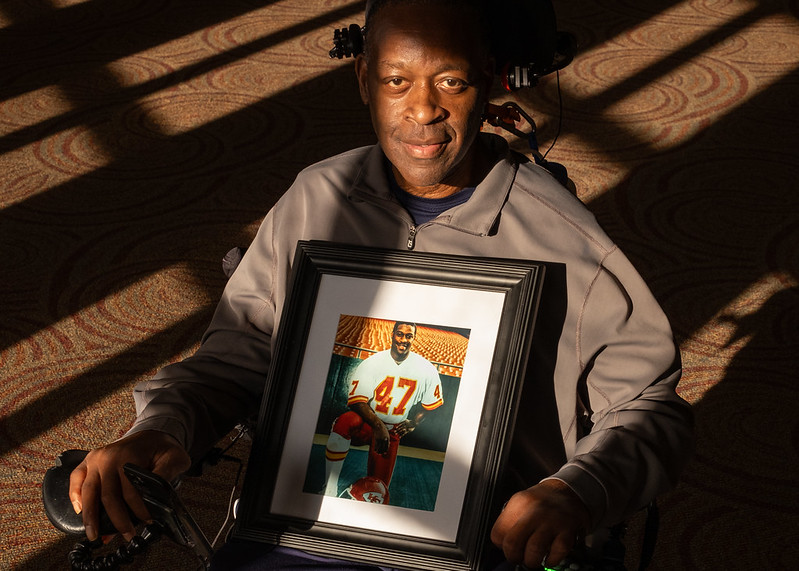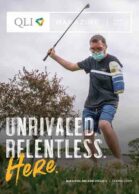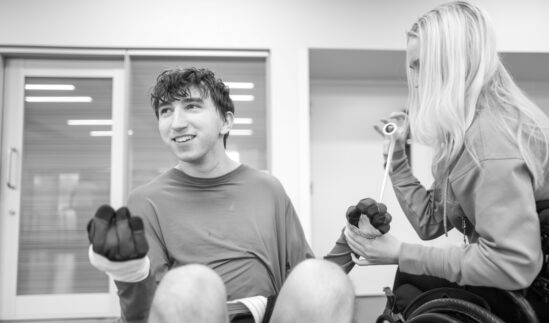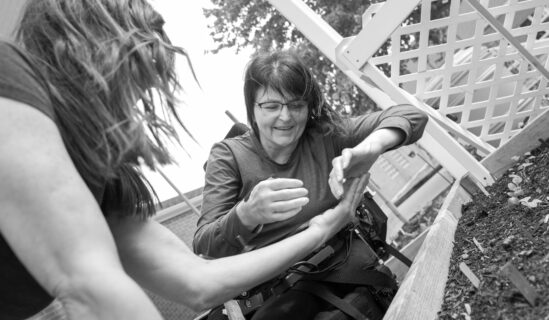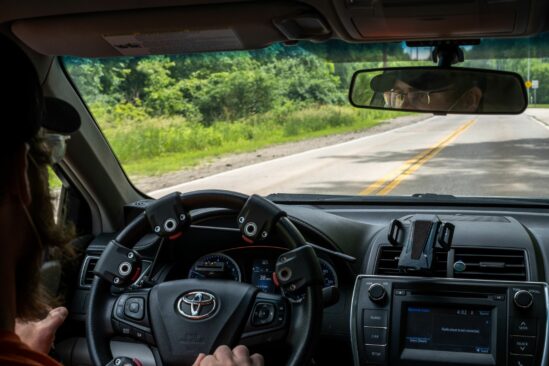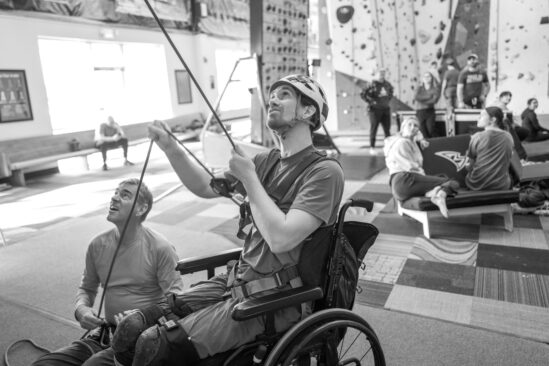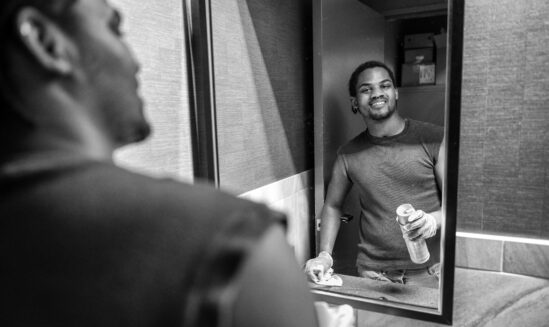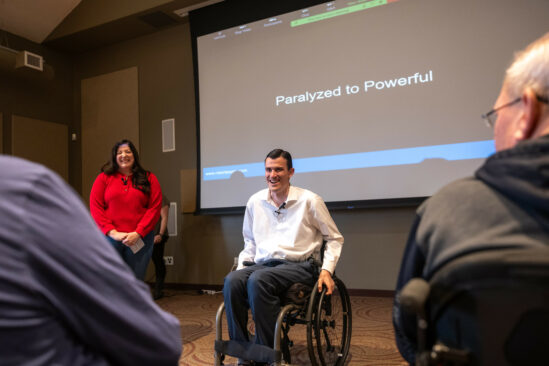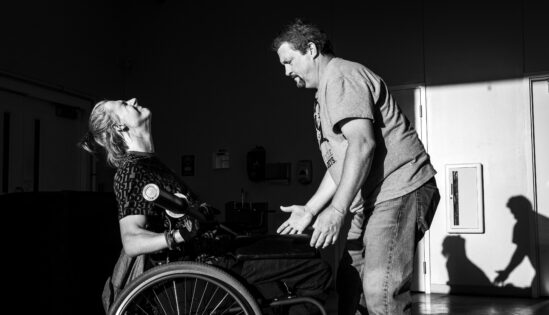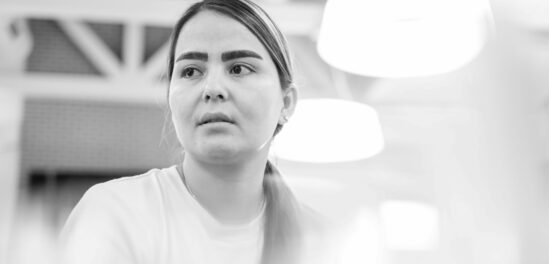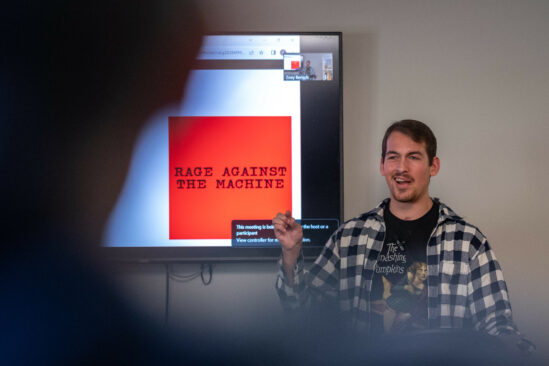His feet are square with the rest of the board. A breath is taken—strong aimed. The space from the crest of his knees to the ends of his toes may not be all that much to an observer. Merely 24 inches, in an exercise position and setup. Physical therapist Connor Davis checks the input on the Total Gym machine. The braised number along the side reads “11,” about six shy of the new line to gain for Chris Smith, now mentally readying himself. His head is supported at the top of the machine’s angle. His feet are on the other end and strapped onto the machine for balance. Another breath now, square and true.
Chris lifts his gaze from his feet to where Connor is standing beside the machine, making a wry remark to kick off the session—“you got my gum?” he asks Connor. Connor checks the bag on the side of Chris’ powered wheelchair.
“Yeah,” grins Connor, snagging a piece for Chris. The gum, perhaps not too unlike Popeye with his spinach, is a little added fuel to the fire already burning within—one bubbling in the firmament of his character. Connor steadies Chris, checking that the gait belt is secure and that his head is in-line, ready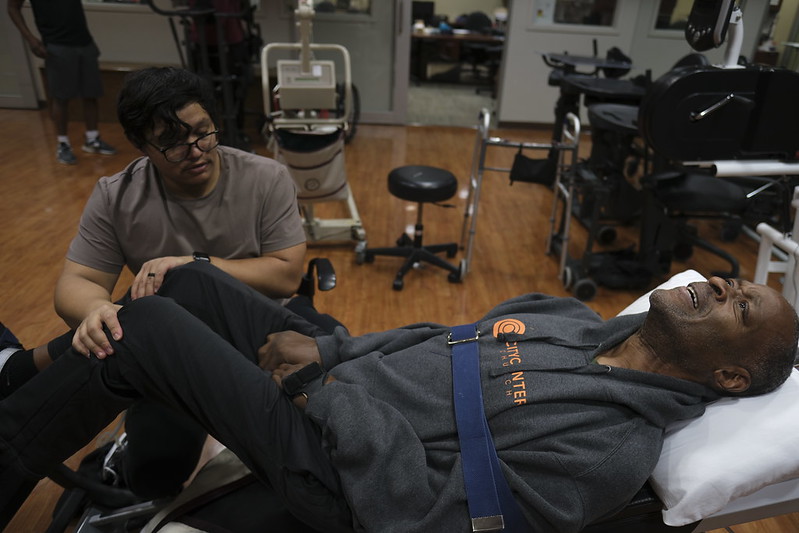 for the descent. Slowly, he assists Chris in letting the machine’s backboard descend, bringing in the work of a squat. The groan is guttural—the work intense. Guiding the board, and Chris to the original position, both Connor and Chris take stock of the situation. The aim—to stay at the “11” grade incline for a handful of reps, and then increase to “12.” By the time the hour is up, Chris has made it to “16,” a new record.
for the descent. Slowly, he assists Chris in letting the machine’s backboard descend, bringing in the work of a squat. The groan is guttural—the work intense. Guiding the board, and Chris to the original position, both Connor and Chris take stock of the situation. The aim—to stay at the “11” grade incline for a handful of reps, and then increase to “12.” By the time the hour is up, Chris has made it to “16,” a new record.
This line to gain is a shade different from the many constant markers of progress Chris made throughout his life. While at QLI, reminders percolate for him on that old line—on the grassy field nearly forty years past, as he and his teammates on the Kansas City Chiefs moved the ball down the litany of white hash marks and over the arrowhead logo dead-center in the field, all to the tune of tens of thousands roaring from the stands in the famous Arrowhead Stadium. This, the arena, lives inside Chris and it has been reawakened and affirmed through QLI.
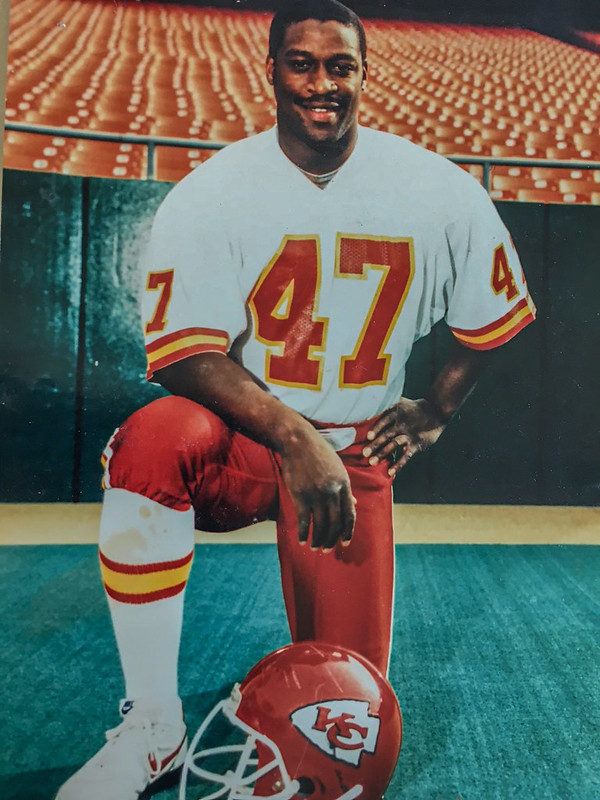
__
Chris is a man tried and true against all kinds of spotlights. Growing up in Cincinnati, Ohio he came of age with the National Football League as it grew in prominence. It seemed inevitable that he would walk the fields that filled his television screen over and again. After high school, Chris was off to Notre Dame for college, culminating in his undrafted acquisition by the Kansas City Chiefs, where he played as a running back for two seasons (’86-’87) before retiring from the sport.
For many who play in the NFL, the league can be a foundation for greater things. His playing career may have been short-lived, but the success of what would come after was anything but. Chris took a high and ambitious road—pursuing a Master’s in Business Administration at Baker University and building a life in Lenexa, Kansas. The values he carried forward were like those in the League—comradery, strong footholds within his community, and a striving for something—continual improvement.
Success, of course, can be measured in various ways, means, and modes. With his wife he raised a family, seeing his son off to his own football career, also at Notre Dame and in the NFL. Chris also rose to be an account executive with T-Mobile, helping to generate products for their Accessibility Division. It wouldn’t surprise anyone that such work came through—a total discipline of the self.
It’s almost with a bitter sense of irony that through this endeavor to ensure he remained in top physical condition Chris sustained his spinal cord injury. At the end of a spin class, Chris got off his exercise bike and felt fatigued. He fell against the wall beside the bike, hitting his head and sustaining a spinal cord injury. Chris was left with severely limited movement in his hands and legs, relying solely on head controls to navigate his powered wheelchair.
__
After injury, there may be a cloud hovering over recovery. It sometimes burrows its way into the back of a mind, where it lives and eats, whispering brutal specks of nothing, sowing seeds of indecision, doubt, 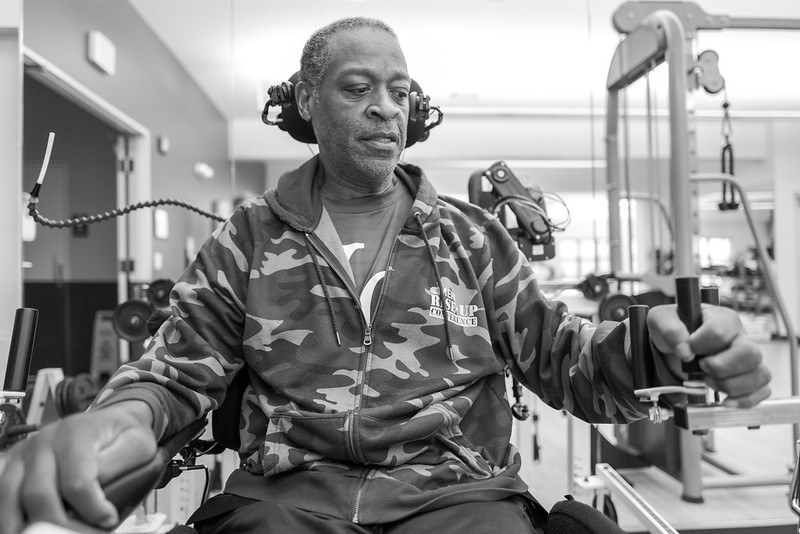 and fear.
and fear.
That you will never be good enough. That you cannot be the person you were before injury, so why bother trying? That your family will never look at you the same.
But these whispers are lies, and though they may flit about internally, they have not made their permanent home in Chris Smith. In his mind, they are vagrants who can be fought against, evicted, and triumphed over.
Part of Chris’ fight against that entropy is faith.
“My faith is who I am,” he says, a surrounding mechanism that must be met by the individual drive and work. Without it, no progress can be made. Of course, desire does not always translate to manifestation. There is the simple truth that even with an ironclad determination and unlimited resources, some abilities simply may not return to the level they were at before injury.
Nevertheless, the will is always present, coupled with the potential, the theoretical. For Chris, he has been told that his type of injury allows the potential for him to walk again. Chris takes great hope in this possibility.
“Faith without works is dead,” reflects Chris.
Part of this work is in seeking a path forward with the guidance of others and building a support system of peers. It is in meeting with mentors and coaches such as QLI Life Path Specialist Chad Arnold that he can bolster himself and build that confidence and fight as Chad himself treads a similar path.
“It’s all about just having these frank conversations with each other,” says Chad. “Figuring out what is going to work and not going to work, and learning a little bit from the reality that I and other mentors have experienced.” Chad works through cultivating courage, and in Chris’ case, weaving his determined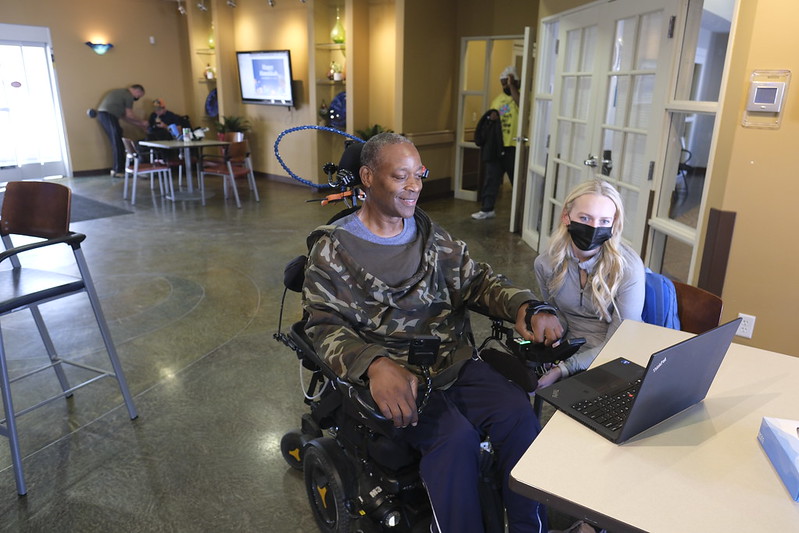 spirituality throughout everything he does. Through those discussions with Chad, doubts and fear were instead replaced by assurance and understanding.
spirituality throughout everything he does. Through those discussions with Chad, doubts and fear were instead replaced by assurance and understanding.
At QLI, every client’s program is built around their center and metaphysical core—their interests and passions, their ideals, and their hopes. The competitor inside Chris, his center and core, never left but needed the support and encouragement his program and the team members involved provided to coax it back to the front.
Early on, when it came to interacting again with his family—his wife Billie, daughter Sheena, and son Brian—and his community from Notre Dame, the NFL, and City Center Church, Chris worried about the perception these individuals would have on who he was post-injury.
In his daily physical therapy sessions with Connor or exercise assistant Hector Alamillo-Fernandez, the tone is relaxed, and one might mistake it at first for being just another casual workout, but it is this way because it’s a testament to the rapport they have established with one another and the fact that Chris’ goals are crystal clear. Because of the tremendous consistency, work, and encouragement, any potential fear is exchanged instead for excitement at the prospect of not only moving past goals or expectations but leaving them spinning in the dust.
“Within Chris,” says Connor, “is the mindset of a true competitor, and we’ve worked together to harness that through his physical therapy and recovery.” This could be seen in the ways they approached the 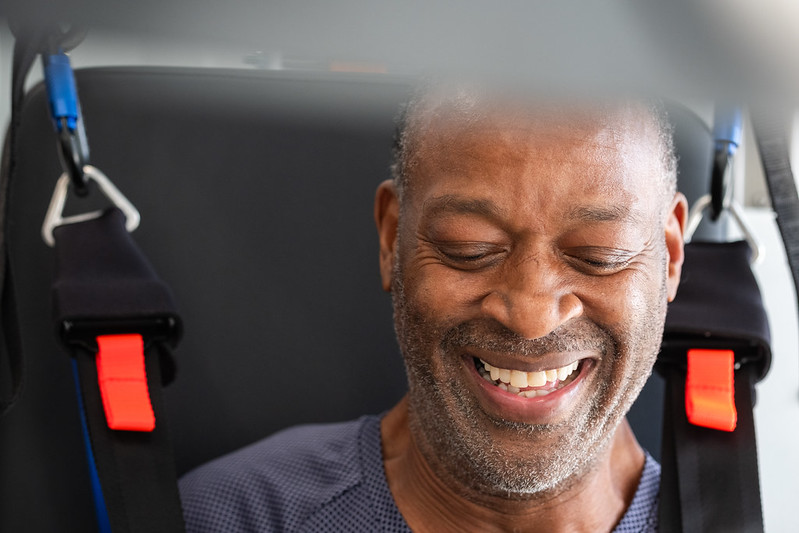 Total Gym machine, with metric goals always top of mind—setting the number at a low reachable amount to begin, then increasing intensity slowly over time, just as athletes in training would do.
Total Gym machine, with metric goals always top of mind—setting the number at a low reachable amount to begin, then increasing intensity slowly over time, just as athletes in training would do.
One of the new realities for Chris to face is the necessity of applying assistive technology in aspects of his life and daily routines where it wasn’t needed before. “Through my work with Chris,” says occupational therapist and assistive technology specialist Olivia Ollis, “he learned to successfully navigate phone applications through voice commands, open doors, and operate household appliances through other voice-activated controls and features.” It is an empowering experience, one in which Chris, through Olivia’s guidance, launched himself.
Chris is now himself a mentor for other clients at QLI. Through open and honest conversations, Chris gives back what he was given by showing that the person he knew he was had never left. Then, in directing the renewed mindset and pairing it with the discipline he has fostered throughout his life in sports and business, he pours all his energies and focus into all sessions and therapies.
Chris is here and the arena is too. He enters it and takes command of his destiny. “It will be my faith that will see me through this,” Chris confidently states. “I’m extremely encouraged with where I’m at and where I’m going. This is a fight that is greater than me, higher than me, but I’m a partner in it all the way.”
